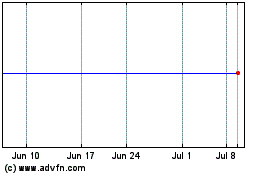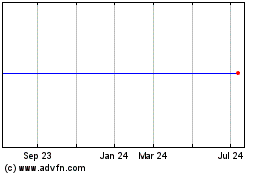By Keach Hagey, Joe Flint and Joshua Jamerson
Sumner Redstone and his daughter Shari Redstone ended their
effort to merge Viacom Inc. and CBS Corp., a big bet that Viacom
can turn around its fortunes on its own in an unforgiving media
environment.
In a statement Monday, the Redstone family's holding company
National Amusements -- which has nearly 80% voting stakes in both
media companies -- said that, after reviewing a tie-up, "we have
concluded that this is not the right time to merge the
companies."
A marriage would have reunited Viacom, owner of
ratings-challenged cable networks like MTV and Comedy Central and
of the slumping Paramount Pictures movie studio, with top
broadcaster CBS a decade after they were split up.
Neither company had been enthusiastic about a merger, despite
the desire of the Redstones to make it happen, and discussions
never advanced beyond the early stages, people familiar with the
situation say. There were also differences in opinion on valuation,
as Viacom wanted a premium that CBS Chief Executive Leslie Moonves
wasn't interested in offering, the people said.
A big reason for the reversal in plans, people familiar with the
matter say, is Ms. Redstone's faith in Bob Bakish, a nearly
two-decade veteran of Viacom who was named acting CEO on Oct. 31.
Mr. Bakish, who previously helmed the company's international
operations, has impressed Ms. Redstone with presentations
suggesting he will restore the creative culture at Viacom. In the
letter, the Redstones praised Mr. Bakish's "forward-looking
thinking and strategic plan."
The Viacom board, which meets on Monday, is likely to take up
the matter of making Mr. Bakish's CEO role permanent, the people
familiar with the matter said.
The decision to explore a merger of the firms followed the
ascent of Ms. Redstone in the family empire after a year of legal
and boardroom drama, and was thought to be at least a partial
solution to Viacom's strategic problems. CBS, which is relatively
stronger, would have been able to help ensure Viacom's weaker
channels aren't dropped by cable-TV distributors and upstart web-TV
players, according to people familiar with the rationale for the
merger. CBS also could have moved to improve Viacom's content, the
thinking went.
In late September, National Amusements sent a letter to the
boards of Viacom and CBS urging them to explore whether a merger
made sense.
At a New York Times DealBook Conference last month, Ms. Redstone
said that a merger made potential sense because "scale is going to
matter" in the media industry, though she stressed that both
businesses could also succeed on their own.
Now, Viacom will be fending for itself once again. And CBS,
despite its relative strength, could also face questions about its
strategy. All content companies are charting strategies for a media
universe where young people are watching less television, where
streaming media is on the rise and where a few giants of content
and distribution -- notably Comcast Corp. and AT&T Inc., which
has a pending acquisition of Time Warner Inc. -- dominate the
scene.
21st Century Fox, for its part, on Friday unveiled a roughly $14
billion bid for total ownership of the U.K.'s Sky PLC, a deal that
would give it a European foothold in pay-TV distribution, premium
sports content and direct-to-consumer streaming. Fox and Wall
Street Journal-owner News Corp. share common ownership.
Shares of Viacom fell 7% in early afternoon trading, while CBS
shares were up 1%.
In the statement Monday, National Amusements called for a focus
on the companies' "independent paths forward."
Mr. Bakish, Viacom's third CEO since August, wanted an
opportunity to try to fix the company rather than merge with CBS.
Mr. Bakish and Wade Davis, Viacom's chief financial officer, made a
presentation to Mr. Moonves and his advisers last month, outlining
a plan for a future performance for Viacom that was more bullish
than analysts were projecting, according to people familiar with
the matter. Mr. Moonves has been complimentary about Mr. Bakish's
plan, the people said.
In his public comments so far, Mr. Bakish has emphasized how
lessons from his decade atop Viacom's international division of the
company can be applied to the company as a whole -- particularly
its focus on six core channels. Viacom, which has some two dozen
channels in the U.S., has been the poster child for an industry
where media companies offer huge bundles of channels, an approach
that is coming under strain as consumers shift to skinnier bundles
and direct-to-consumer streaming options.
Viacom has had conversations about the potential need to slim
down the number of channels, according to people familiar with the
matter, though no decisions have been made.
Mr. Bakish has dispatched Mr. Davis to Paramount to help improve
the movie studio's finances, Mr. Bakish told investors at a UBS
conference last week. Ms. Redstone feels that she is now getting
more insight into what's happening at Paramount under Mr. Bakish's
leadership than she has had in a decade, according to a person
familiar with the matter.
At CBS, meanwhile, insiders were worried about being saddled
with weak Viacom assets.
Ms. Redstone and Mr. Moonves held preliminary, informal talks
earlier in the year about a potential merger -- before the
companies' boards set up special committees to evaluate a deal. Mr.
Moonves wanted assurances that he would have enough control over
the merged entity to avoid the fate of former Viacom CEO Philippe
Dauman, who was ousted this summer amid a power struggle with the
Redstone family, people familiar with the matter said.
Ms. Redstone wasn't willing to give up control, but she was
willing to meet Mr. Moonves halfway -- meaning that issues of
control weren't the main driver of National Amusements' decision to
pull away from exploring a merger.
CBS, which also owns the Showtime premium channel, has
repeatedly told investors it would be a strong stand-alone company.
It has positioned itself for the rapidly changing digital-media
landscape with "CBS All Access," a digital-subscription service
that offers CBS shows and that recently added coveted National
Football League games.
People familiar with the matter say CBS is open to other
potential deals, including acquiring or investing in digital-media
firms. CBS is also in the process of spinning off its CBS Radio
unit.
Write to Keach Hagey at keach.hagey@wsj.com, Joe Flint at
joe.flint@wsj.com and Joshua Jamerson at
joshua.jamerson@wsj.com
(END) Dow Jones Newswires
December 12, 2016 13:42 ET (18:42 GMT)
Copyright (c) 2016 Dow Jones & Company, Inc.
CBS (NYSE:CBS)
Historical Stock Chart
From Mar 2024 to Apr 2024

CBS (NYSE:CBS)
Historical Stock Chart
From Apr 2023 to Apr 2024
